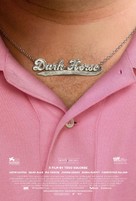Reviews provided by RottenTomatoes
A.O. Scott, New York Times: Its departures from realism have the effect of enlarging the narrow, unremarkable lives that are its focus, and by extension the audience's sense of what those lives might mean. Read more
Scott Tobias, AV Club: To a small extent, the concept puts enough of a shine on the material to make it seem new again. Read more
Bill Goodykoontz, Arizona Republic: That Gelber can make Abe appealing in any way is a triumph. That Solondz can orchestrate such a feat is an even bigger one. Read more
Mark Feeney, Boston Globe: Solondz has made a career out of specializing in highly aberrant views of middle-class life. Read more
Michael Phillips, Chicago Tribune: Abe may deserve all that comes to him, but the question of how he got this way sustains the picture, against all odds. Read more
Owen Gleiberman, Entertainment Weekly: The most squirm-inducing aspect of Dark Horse is the way that Solondz is still stuck in his outdated loser tropes. Read more
Todd McCarthy, Hollywood Reporter: Never less than watchable and loaded with trademark negativity so extreme it's sometimes funny, the new film is nonetheless saddled with a protagonist so narrowly and unlikably presented that, in the end, he doesn't seem worth the time devoted to him. Read more
Stephanie Zacharek, Los Angeles Times: For once, Solondz seems less interested in scoring points off his characters than in creeping into their shy, sad interior worlds. Read more
Rene Rodriguez, Miami Herald: Solondz will never be much for happy endings, but the film is strangely optimistic and at times borders ever-so-slightly on the whimsical. Read more
John Anderson, Newsday: Even though Todd Solondz' latest journey into suburban dysfunction may seem dark (and is), it's also about joy, and how easily it's wasted. Read more
David Denby, New Yorker: Solondz is a minor master of black comedy-the flattened emotional responses, the grotesque non sequiturs, the perverse desires lurking under a bland surface. Read more
Stephen Whitty, Newark Star-Ledger: Characters turn out to have improbable secret lives, or pop in and out like hallucinations. Plotlines that start to satisfy, attitudes that start to make sense, are ruthlessly upended. Read more
Ian Buckwalter, NPR: Despite its flaws, Dark Horse largely succeeds as yet another installment in Todd Solondz's career-long examination of the lust for love and security among the deeply damaged. Read more
David Edelstein, NPR: It's tough to get on Todd Solondz's wavelength, but boy is it worth the emotional gyrations. Read more
Joe Neumaier, New York Daily News: "Dark Horse" joins "Dollhouse" and "Happiness" as a kind of trilogy of personality terror. It ultimately wanders too far out there, but before that it's quirky and curious enough to be happening in any house next door. Read more
Sara Stewart, New York Post: It's a typical Solondz sad-sack tale, but this film seems to be disgusted by its own characters, which isn't true of the director's best work. Read more
Tirdad Derakhshani, Philadelphia Inquirer: [A] wonderfully realized and surprisingly understated dark satire... Read more
Roger Ebert, Chicago Sun-Times: There are times when it is dark humor, and then times when it is simply dark. But there is something more going on here, something deeper and more ... hopeful? Read more
Amy Biancolli, San Francisco Chronicle: [Solondz] pulls one too many narrative stunts, with one too many dream sequences, calling into question the reality of everything that's happened - including that soap-operatic finale. Read more
Colin Covert, Minneapolis Star Tribune: Todd Solondz, the dean of depressive comedy, is back with another funny, shocking, emotionally probing original. Read more
Joe Williams, St. Louis Post-Dispatch: With champion bloodlines from Walken and Farrow, "Dark Horse" could have been a contender, but it gets so skittish about trodding a familiar path that it pulls up lame. Read more
Kate Taylor, Globe and Mail: You have to admire the filmmaker for what he has achieved thus far in Dark Horse, and mourn Abe's premature departure from the action. Read more
Richard Corliss, TIME Magazine: Solondz's most waywardly endearing film, his gentlest triumph. Read more
Dave Calhoun, Time Out: Solondz's latest, 'Dark Horse', is similar to his first film, 'Welcome to the Dollhouse' (1995), in the way it piles cruelties on one misguided character. Read more
Joshua Rothkopf, Time Out: Even with Dark Horse's brief running time, staying in Abe's company is a serious test of negative entertainment. Read more
Peter Howell, Toronto Star: As awful as Abe is, you can't help rooting for him as he struggles to get his life in order, all while his vivid fantasy world seems to be closing in on him. Read more
Nick Pinkerton, Village Voice: Dark Horse is neither incisively black-comic nor particularly attuned to human behavior-proof that some directors, at least, do end up the way they started out. Read more
Ann Hornaday, Washington Post: It would be unfair and patronizing to say that Solondz needs to grow up, but "Dark Horse" suggests that it's time for the bard of bourgeois hypocrisy to consider moving on. Read more

